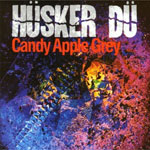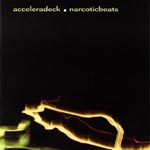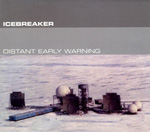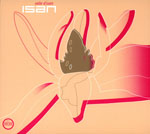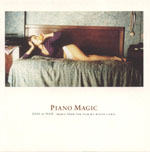Autechre, Basscad,ep (CD single, 1994)
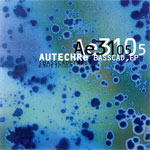 When I left Cambridge for Rome, I generally neglected to make any plan for doing anything with those possessions of mine that I couldn’t fit into a suitcase. Some ended up in the Co-op basement; a majority were left in the Cognoscenti office in Winter Hill – as Cognoscenti went under while I was away, I don’t know what happened to those things – and a couple of boxes of books & CDs were left with people who might appreciate them. Some of these things came back, some didn’t; for the most part this was no particular loss. It’s a lot of work having things; or rather, it feels nice to leave them all behind: the idea of starting fresh and escaping one’s past seems increasingly impossible, but at the turn of the century there was still that promise.
When I left Cambridge for Rome, I generally neglected to make any plan for doing anything with those possessions of mine that I couldn’t fit into a suitcase. Some ended up in the Co-op basement; a majority were left in the Cognoscenti office in Winter Hill – as Cognoscenti went under while I was away, I don’t know what happened to those things – and a couple of boxes of books & CDs were left with people who might appreciate them. Some of these things came back, some didn’t; for the most part this was no particular loss. It’s a lot of work having things; or rather, it feels nice to leave them all behind: the idea of starting fresh and escaping one’s past seems increasingly impossible, but at the turn of the century there was still that promise.
So it was a surprise when an email arrived from M. a few weeks back saying that she’d discovered some of my boxes in her parents’ basement and did I want them? Of course I did; and a heavy box promptly arrived here full of books and CDs, a slightly used Christmas where I’d bought most of the presents myself. The books present a snapshot of a certain point in time: Richard Powers, Charles Olson, Melville’s Pierre, Evan Dara’s The Lost Scrapbook, a handful of copies of The Baffler: respectable, mostly. I did feel a twinge of disappointment that my signed copy of The Broom of the System is most likely lost forever. There were more CDs: a lot of Scott Walker, a lot of Autechre, some Stereolab, a bunch of inserts for CDRs handwritten in green pen, my Joy Division box set. Looking through these things, I can’t avoid feeling embarrassed for my past self’s pretentiousness – did I foist these things on M.? did she select them? I don’t know.; probably it’s not worth digging into.
This CD was on the top of the pile. It’s a CD single, the first thing I bought by Autechre; this would have been when I was a sophomore in college which was during the brief window when the record companies were putting out very long CD singles. They were cheap; every record store had a rack of them, and they often seemed like a decent risk when it was closing in on midnight at Tower Records, you needed something new, and had very little money. It goes without saying that most were terrible and the magic fell out of them quickly; so there was a lot of consideration of the rack. This one I know I thought about many times before buying: it was cheap and Autechre was associated with Aphex Twin, but it looked imposing. I remember almost being afraid of it: it might be too hard, I thought, though I’m not sure what that would have meant.
This CD still looks good: the cover image is blue and purple droplets on a green background, something like a restrained psychedelic light show, though more oceanic; the image on the reverse uses the same colors with video-like distortion. The text, though, conveys most of the affect: layered, screened out, multi-sized, negative leading. There’s a flagrant disregard for punctuation, connective words, spaces, and vowels; numbers are all over the place; the case of characters changes at random. It’s made to look technical: track numbers are given as “0.01” and “0.02,” while track lengths are listed as “410SECS.” The inlay is clear. It’s dated now, of course: you look at this and immediately think Ray Gun or Designers Republic, early nineties – and this is, of course, a DR sleeve. It’s been done to death since. Fifteen years ago this looked hopelessly exciting: it smacked of “computers” when computers where still something things could smack of. The signifiers of science fiction are there, even if there’s no overt narrative: “basscadet” suggests “space cadet”; space ship displays would use the same monospaced fonts; in the future, everything would seem technical and we would have no time for spaces between words. A few years later computers would be out, but the sensibility filtered down to the masses; everyone was wearing t-shirts with big-eyed aliens on them.
The music is pleasant, if it no longer feels as dark and inhuman as it once did. It feels like techno: things happen regularly, there are occasional breaks, you could almost dance to it. Things build and repeat. There are vocals, but they’re deeply buried and the listener only gets the sense of words. The tracks are recognizably song-like if not songs; Björk could have sung over most of this. The track I remember liking most at the time was the “Beaumonthannanttwomx,” a remix done by one Beaumont Hannant: it feels sparkly, sounds echo back and forth very quickly, and there’s a majestic build. Now this feels like something I’d discount for trying to be emotionally manipulative: it feels too cinematic, though movies didn’t sound like this then. It’s sad and yearning: I can see why a teenager would have liked it. The Seefeel remix still feels claustrophobic in the right way, siren-like loops in a dubby echo chamber, the vocal samples distorted still further. It’s no longer techno, but a little too exciting to be ambient. The “Tazmx” slows down the techno to become something which feels more hip-hop than I would have admitted at the time, washes of strings, some scratches. Trip-hop, I guess. It outstays its welcome. The last mix takes away the beats of the original, stretches everything out, and adds echo, not quite dub but something close.
I decided I liked this & bought a lot of other Autechre CDs; the thrill wore off about the time that they came out with Confield and I realized that I liked the fake tracks that had been floating around the Internet more than the actual album, though I stayed with them for a bit. The whole project started to seem too hermetic: this is, at a very basic level, headphone music, a music about isolation. Now it seems like the music of a teen romantic.
